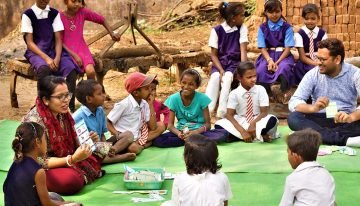The quality of education has been the guiding principle of our work
Our Field Institutes are in 59 districts of seven states and one Union Territory. Over 1,700 of our team members work in these institutes, living in over 320 towns within these districts. We also run 263 ‘Teacher Learning Centres’ in these 59 districts. This grassroots organisation we have built over the last 20 years enables us to do intense, deep and continuing work.

The genesis of these Field Institutes lies in our extensive work in the field of Education. We began in 2001, with the resolve of supporting the government school system of India. We started with programmatic interventions in schools, in order to address pressing issues such as reducing the rate of dropouts and making schools safe and inclusive spaces. After a decade, we shifted our approach to a more institutional mode. This is when we decided to set up the Field Institutes, through which we now do a range of our own work, from Education to Health and Livelihoods.
This ground-level institutional presence has made us a part of the local community. This enables us to engage with issues and priorities in a relevant and precise manner. These Field Institutes are key to our efforts to help improve the quality and equity of the government school system. As a part of this work in Education, we also run nine demonstration schools. These are known as Azim Premji Schools.
With this institutional network, we have been able to expand our work to other areas, such as Health (including the running of creches), Livelihoods and Youth Engagement. Most of our work is in collaboration with state governments, and to help improve public systems.
Following our large-scale involvement in relief and vaccination-related work during the COVID-19 pandemic, the Foundation’s initiatives in Health were introduced in 2022, at three slum clusters in Bengaluru. It then expanded to 10 districts around the borders of Jharkhand and Chhattisgarh in 2023. In the same year, we introduced a master’s degree programme in public health at our university in Bhopal (MPH).
We work to improve the health of vulnerable households — from remote Adivasi communities to urban informal settlements.
The other key domain of our work is Livelihoods.
We want to help make significant and sustained improvements to the household incomes of some of the most vulnerable communities of the country. From encouraging value additions to traditional livelihoods to spreading awareness on entitlements under government Acts such as MNREGA and National Food Security Act, our teams cover significant aspects of income generation.
Beginning in 2022, we have taken our first steps in working towards sustainable livelihoods in the central Adivasi belt of Raigarh and Gumla districts of Chhattisgarh and Jharkhand respectively.
In addition to the seven states where we have Field Institutes, we also work on similar matters in 10 other states. Our work through the University Resource Centre ranges from consultative workshops with senior education functionaries and reforming state board examinations, to capacity development of teachers and teacher educators.
The work done by our Field Institutes includes:
- Capacity development of cadres, such as teachers, principals, panchayat functionaries, community and primary health workers, block- and district-level functionaries, and state-level administrative leaders.
- Engagement with youth for social action.
- Projects with farmers, communities and panchayats on livelihoods.
- Range of support to institutions such as Cluster and Block Resource Centres in Education, District Institutes of Education and Training (DIET), Boards of Secondary Education and State Councils of Education Research and Training (SCERT).
- Development of curriculum and textbooks, improvement in assessment and examinations, and formulation of policy and its implementation.
- Using primary data from the districts we work in, we also conduct field research studies on key issues in school education.



